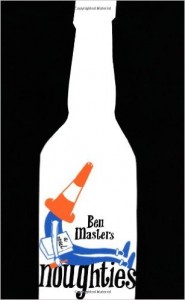Dr Ben Masters is a novelist, critic and lecturer in Creative Writing at the Open University. He was born and raised in Northamptonshire, attending a state school in the area before receiving his BA and MSt in English from the University of Oxford, and his PhD from the University of Cambridge. He was a Senior Lecturer at Manchester Metropolitan University from 2013 until taking up his post at the Open University in October 2014. His first novel, Noughties was published in 2012 with Hamish Hamilton and Penguin in the UK, and Hogarth (Crown) in the US. He has written articles and reviews for the Times Literary Supplement, Guardian, New York Times and Five Dials.
Could you please tell Ink Pantry about your first novel, Noughties ? Also, what were the highs and lows of such an undertaking?
Noughties is a comic novel about university life. One of the challenges was to write a flawed and often unlikeable narrator who has anti-heroic qualities yet maintains the reader’s engagement. Just as Eliot is a voracious and slightly bemused reader of books, he is also an over-reader and mis-reader of reality, which creates lots of potential for comedy and tonal awryness. That was energising from a writer’s perspective. Noughties is very much a voice novel, so the writing of it was led by the voice and the momentum it generated – this becomes a self-perpetuating way of writing, which is useful for the rookie novelist, I think.
One of the biggest challenges came after the actual writing. As is probably the case for a lot of first-time novelists, I felt like I had moved on from the book by the time it came out. Growing pains, perhaps. As a writer you’re always thinking about the next thing and hopefully continuing to evolve.
Your forthcoming book The Ethics of Excess is about exploring the relationship between style and ethics in fiction, considering writers such as Nabokov and Angela Carter. Could you please give us brief examples of this concept, with regard to these particular authors?
The Ethics of Excess is basically a defence of stylistic flamboyance and the art of overwriting, as well as an exercise in lyrical close reading. I’m interested in how a writer’s style (ranging from language choice to rhythm, syntax, imagery, wordplay, tone, point of view) might embody or enact ethical concerns and commitments, which I interpret broadly – whether it be a commitment to curiosity, to individuality, to choice, to complexity, or even to discomfort. So I re-evaluate extravagant stylists like Anthony Burgess, Angela Carter and Martin Amis, who have often been dismissed as morally shallow or circumspect precisely because they privilege style over character and plot, and probe at how their writing styles perform ethically challenging and renewing ways of thinking (how they think in style) and how this might then act on the perceptions of the reader.
You hold talks and read at literary festivals, including the Edinburgh Book and Port Eliot. Could you share your most memorable time?
The first festival talk I ever did was disrupted at the start by a rogue mouse, which sent the audience into a bit of a panic. Like any young writer, I was just pleased to have another audience member.
You have written articles and reviews for the Times Literary Supplement, The Guardian, and the New York Times. What would be your advice for new writers who are looking for a career in that area?
As with all writing advice, it begins with reading. You’ll already be reading widely if you want to write literary essays and reviews, but I would advise new writers in this form to make sure they read lots of other critics. Just like novelists and poets, the best critics have their own distinctive styles and priorities. Find those who speak to you most (or even who animate or agitate you most) and think about their artistry as much as their ideas (the two are likely to be inextricable).
Have you any advice for our Ink Pantry followers on the motivation to write? Have you had writer’s block, and, if so, how did you deal with it?
I’m not sure about motivation. It makes me think of someone in colourful Lycra bursting into my study with a whistle and making me do star jumps. If writing is the thing for you, it will be more of a compulsion or necessity. (If you do ever need a pep talk, that’s what other books are for.) That’s not at all to say that it comes easily – in my experience there are days when writing can be excruciating work, especially if you get as easily distracted as I do. But there should be something about putting words on the page that is essential to how you think and express yourself.
I’m not much of a planner. I like to make discoveries in the act of writing. I find that I think in and through writing (I suppose you could classify that as a motivation or reason for writing). So writer’s block is something to be staved off at all times. There’s a lot to be said for just making sure you sit down at your desk every day. But I also find that I solve lots of problems when I’m away from my writing – going for a walk, watching basketball on TV, going to the cinema. However, that’s all different from searching around for something to write about in the first place. If writing is for you, a shortage of subjects or ideas hopefully won’t be a problem.
Which authors have inspired you?
When I was a teenager the Beats were the first to get me really excited about ‘adult’ literature outside of the classroom. Reading Amis when I was a student led me to giants like Nabokov and Bellow. Then there’s Virginia Woolf, Angela Carter, J.G. Ballard, William Golding, Martha Nussbaum, James Wood … too many to name really.
Picture credit: Angus Muir


